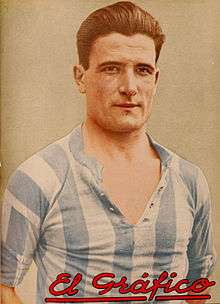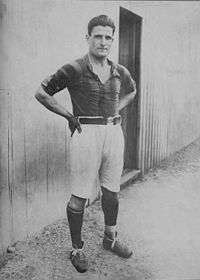Luis Monti
 Monti covered on El Gráfico, 1934. | ||||||||||||
| Personal information | ||||||||||||
|---|---|---|---|---|---|---|---|---|---|---|---|---|
| Full name | Luis Felipe Monti | |||||||||||
| Date of birth | May 15, 1901 | |||||||||||
| Place of birth | Buenos Aires, Argentina | |||||||||||
| Date of death | September 9, 1983 (aged 82) | |||||||||||
| Playing position | Midfielder | |||||||||||
| Senior career* | ||||||||||||
| Years | Team | Apps | (Gls) | |||||||||
| 1921 | Huracán | ? | (?) | |||||||||
| 1922 | Boca Juniors | 0 | (0) | |||||||||
| 1922–1930 | San Lorenzo | ? | (?) | |||||||||
| 1930–1939 | Juventus | 225 | (20) | |||||||||
| National team | ||||||||||||
| 1924–1931 | Argentina | 16 | (5) | |||||||||
| 1932–1936 | Italy | 18 | (1) | |||||||||
| Teams managed | ||||||||||||
| 1939–1940 | Triestina | |||||||||||
| 1940–1941 | Juventus | |||||||||||
| 1942–1943 | Varese | |||||||||||
| 1944 | Varese | |||||||||||
| 1945–1947 | Atalanta | |||||||||||
| 1947 | Vigevano | |||||||||||
| 1947–1948 | Huracán | |||||||||||
| 1949–1950 | Pisa | |||||||||||
Honours
| ||||||||||||
|
* Senior club appearances and goals counted for the domestic league only. | ||||||||||||
Luis Felipe Monti (May 15, 1901 – September 9, 1983) was an Italian Argentine footballer who played as a midfielder and an Olympian. Monti has the distinction of having played in two FIFA World Cup final matches with two different national teams. He played the first of these finals with his native Argentina in 1930, which was lost to Uruguay; and the second with Italy as one of their Oriundi in 1934, thanks to his Romagnol descent.[1] This second time Monti was on the winning side in a 2–1 victory over Czechoslovakia.
Monti was a rugged and ruthless player, but had the technical skills to go with his strong tackling. He played as an attacking centre half in the old-fashioned Metodo system: a position roughly equivalent to the defensive central midfield position of today. As such he would mark the opposing centre forward when his team were defending, but would be the main midfield playmaker when his team were on the attack, due to his passing and creativity.[2] He was nicknamed doble ancho (double wide) due to his coverage of the pitch.
Career
Argentina

Monti started his career in 1921 with Huracán, where he won the first of his many championships. The following year he signed with Boca Juniors but left without playing a game. He joined San Lorenzo where he won a further three Argentine championships. All of Monti's honours in Argentina were recorded during the Amateur Era.
Monti was first called up to represent the Argentine national team in 1924. He won the 1927 South American Championship and the Silver Medal at the 1928 Summer Olympics.[3] With Monti as a key player, Argentina cruised to the World Cup final in 1930, defeating France, Mexico, Chile, and the United States. Monti scored two goals along the way, and injured opponents with his tackling. Some sources speculate that Monti was carrying an injury, but whatever the truth, and despite a death threat,[4] he had a quiet game as Uruguay triumphed 4–2.
Italy
In 1931 Monti was signed by the Italian club Juventus, as he had Italian citizenship. As he was overweight and out of condition, he had a month's solitary training. Monti was back to top form helping Juventus to four consecutive Serie A titles (1932 to 1935), also serving as the club's captain. Monti went on to play 225 matches and score 19 goals in Italy.
He was also called up, within a year, to play for the Italian national team as an oriundo. Hosts Italy won their way to the 1934 World Cup final and defeated Czechoslovakia 2–1.
The Battle of Highbury
The Battle of Highbury is a match that took place between Italy and England on November 14, 1934 at Highbury, the home ground of Arsenal. Monti was playing centre half for Italy, but as early as the second minute he broke a bone in his foot after a clash with England centre forward Ted Drake. Down to 10 men, in the days before substitutes, Italy succumbed 2–3. Monti was only to play twice more for Italy.
In total Monti won 16 caps (5 goals) for Argentina between 1924 and 1931, and 18 caps (1 goal) for Italy between 1932 and 1936.
After football
Monti became manager after retiring. He died in 1983 aged 82.
International goals
Argentina's goal tally first
| # | Date | Venue | Opponent | Score | Result | Competition |
|---|---|---|---|---|---|---|
| 1. | 31 August 1924 | Estadio Centenario, Montevideo, Uruguay | | 3–0 | 3–2 | Friendly |
| 2. | 13 June 1928 | Olympic Stadium, Amsterdam, Netherlands | | 1–1 | 1–2 | 1928 Summer Olympics |
| 3. | 15 July 1930 | Estadio Centenario, Montevideo, Uruguay | | 1–0 | 1–0 | 1930 FIFA World Cup |
| 4. | 26 July 1930 | Estadio Centenario, Montevideo, Uruguay | | 1–0 | 6–1 | 1930 FIFA World Cup |
| 5. | 4 July 1931 | Estadio Sportivo Barracas, Buenos Aires, Argentina | | 1–1 | 1–1 | Copa Rosa Cheva |
Honours
Club
- Huracán
- San Lorenzo
- Argentine Primera División (3): 1923, 1924, 1927
- Juventus
International
- Argentina national team
- South American Championship (1): 1927
- Silver Medal at the Summer Olympics (1): 1928 Amsterdam
- Italy national team
- FIFA World Cup (1): 1934
Individual
References
- ↑ "Azzurro oriundo, ma serve in un Mondiale?". gqitalia.it. GQ Italia. 9 June 2014. Retrieved 2 June 2015.
- ↑ Blair Newman (24 April 2015). "The relationship between a player's age and their position on a football pitch". The Guardian. Retrieved 22 January 2016.
- ↑ "Luis Monti". Olympics at Sports-Reference.com. Sports Reference LLC.
- ↑ Death threat, 1930 World Cup Final: World-Cup-Bets.com website. Retrieved on March 6, 2008.
- ↑ "FIFA World Cup Awards: All-Star Team". Retrieved 19 August 2015.
External links
| Wikimedia Commons has media related to Luis Monti. |
- Detail of international appearances for Argentina and Italy, by RSSSF
- Biography at Planet World Cup
- (Spanish) Futbol Factory profile at the Wayback Machine (archived October 20, 2007)
- (Italian) Short bio at La Gazzetta dello Sport
| Sporting positions | ||
|---|---|---|
| Preceded by Virginio Rosetta |
Juventus F.C. captains 1935–1938 |
Succeeded by Mario Varglien Iº |